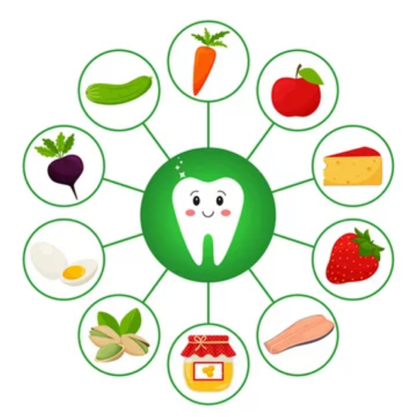

When your child eats or drinks sugars, the germs (bacteria) in your child’s mouth mix with the sugars to make a mild acid. This acid attacks the hard outer layer of teeth (also called enamel). It can make holes (or cavities) in the teeth.
The damage that sugars do depends on how much sugar goes into the mouth and how long it stays in the mouth.
Natural sugars can have the same effect on teeth as white (or refined) sugar out of the bag! Many healthy foods contain natural sugars. Milk contains natural sugar.
Putting your child to bed with a bottle of milk can cause cavities. Unsweetened fruit juice may have no added sugar but has natural sugars in it. If your child is always sipping juice between meals, the teeth are being coated in sugars (and acid) over and over again.
Water is the best drink to have between meals. Starchy foods, like teething biscuits, break down to make sugars. If these kinds of food stay in your child’s mouth long enough, they will make the acid that can cause cavities. Brushing or rinsing the teeth helps remove sugars. But limiting sugar intake is even better.
Read the labels of the packaged food you buy. Every ingredient is listed by weight. So, if a sugar is listed first, you know that there is more sugar than anything else. These are sugars you can look for on labels: corn sweeteners; corn syrup; dextrose; fructose; glucose; honey; maple syrup; molasses and sucrose. Children aged seven and older can help read labels to find foods low in sugar. If grocery shopping involves a never-ending plea for sugary foods, if possible, do the shopping without your child.
Snacks
Do not give your child sugary foods that stay in the mouth for a long time (gum with sugar, suckers (lollipops), and hard candy. Avoid soft, sticky sweets that get stuck in teeth such as toffee, raisins and rolled-up fruit snacks or fruit leather.
Keep good snacks at hand. Have carrot sticks or cheese cubes on the bottom shelf of the fridge. Children like small things like small fruits and vegetables, and small packs of nuts or seeds (provided they are safe for your child).
To keep your child from asking for sweets, do not buy them. If they are not in the house, you can’t give them out. If you do serve sweets, limit them to meals. When your child is eating a meal, there is more saliva in the mouth. This helps to wash away the sugars.
Consider a family rule of one sugary treat per week (including the sugary cereals) or only on weekends to reinforce that these are TREATS.
